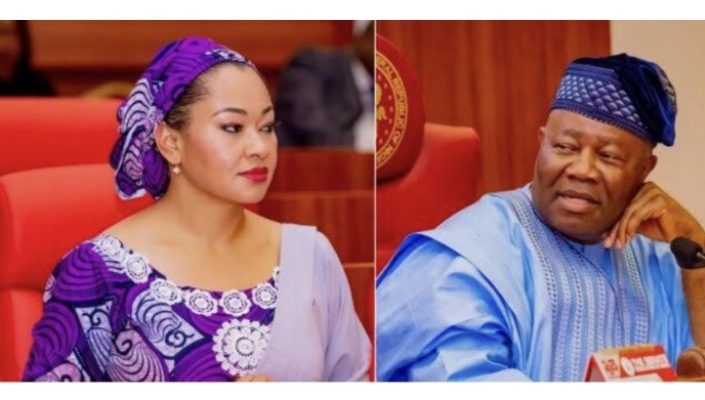The recent allegations by a female senator, Senator Natasha Akpoti-Uduaghan against Senate President Godswill Akpabio have ignited widespread debate, not only on the credibility of the claims but also on the broader implications for gender representation, political ethics, and public decorum in Nigeria’s legislative chambers. While sexual harassment allegations should never be dismissed outright, the manner, timing, and underlying political tensions surrounding this case raise critical questions that must be examined holistically.
- The Credibility of the Allegations
One of the most contentious aspects of this issue is the senator’s delay in making the allegations public. If such misconduct had occurred, why wait until a public confrontation before speaking out? This delay naturally raises suspicions of political motivations rather than a genuine pursuit of justice. In societies with strong legal frameworks, allegations of sexual misconduct are expected to be addressed immediately through appropriate legal and institutional channels, not thrown into the public sphere only after a personal or political fallout.
Furthermore, the idea that a female senator—an individual in one of Nigeria’s most powerful political institutions—felt unable to speak up earlier undermines confidence in the legislative body’s ability to handle internal disputes. If even lawmakers cannot trust the system for redress, what hope is there for ordinary citizens facing similar issues?
- Political Undercurrents and Personal Interest
It is crucial to recognize the power dynamics at play. Akpabio is a seasoned politician who has faced various controversies in his career. If there were indeed misconduct on his part as a senator, one would expect that other female senators might have come forward with similar experiences. The absence of corroborating voices at the Senate raises the question of whether this is an isolated case or a politically motivated attack.
Additionally, Nigerian politics is notorious for internal rivalries, where personal grievances are often disguised as moral or ethical crusades. Could this be another case of political maneuvering disguised as a gender rights issue? If so, such tactics do more harm than good, as they undermine genuine efforts to combat sexual harassment in Nigeria.
- Conduct and Respect for the Institution
Regardless of the validity of the allegations, the senator’s behavior on the Senate floor—now widely circulated on social media—raises concerns about decorum and respect for legislative proceedings. The National Assembly is meant to be a place of serious governance, where laws are debated and national policies are shaped. Personal grievances, no matter how valid, should be addressed through official complaints, ethics committees, or legal channels, rather than public outbursts that reduce the dignity of the institution.
The senator’s actions also feed into negative stereotypes about women in leadership. Instead of strengthening the case for more female representation in politics, such public confrontations can reinforce the perception that women in power resort to emotional outbursts rather than strategic engagement. This is a disservice to the broader cause of gender equality in Nigerian politics.
- The Gender Politics of the Allegation
This controversy also exposes the double standards in how male and female politicians are judged in Nigeria. If a male senator had made a similar public scene, the criticism might have been equally severe, but it would not have been framed as a setback for all men in politics. However, because a woman is involved, the fallout affects perceptions of female politicians as a group. This highlights the need for women in leadership to be particularly strategic in how they engage in political battles.
Additionally, weaponizing gender-related accusations for political advantage sets a dangerous precedent. It trivializes the real struggles of women who face sexual harassment daily and could discourage genuine victims from coming forward in the future. When serious allegations become political tools, they lose credibility, making it harder for real cases to be taken seriously.
- Broader Implications for Nigerian Politics
This incident reflects deeper issues in Nigerian governance:
The lack of structured conflict resolution mechanisms in the legislature, leading to personal grievances being aired publicly.
The use of scandals as political weapons, distracting from pressing national issues like economic hardship, insecurity, and governance failures.
The erosion of public trust in lawmakers, as citizens increasingly see the National Assembly as a theater of personal battles rather than a body for serious legislative work.
Conclusion: A Lesson for Nigerian Politics
While it is crucial to take allegations of misconduct seriously, political actors must recognize that how they handle disputes shapes public perception and institutional credibility. If this senator truly faced harassment, she should have pursued legal action immediately rather than allowing the matter to be overshadowed by political and personal drama. At the same time, Akpabio and other male politicians must understand that power should never be used to exploit or intimidate women, whether in politics or any other sector.
Ultimately, this incident should serve as a wake-up call for Nigerian lawmakers to establish stronger ethical standards, gender-sensitive policies, and professional mechanisms for handling disputes. If not, the National Assembly risks further degenerating into a place of political theatrics rather than a respected legislative institution.




